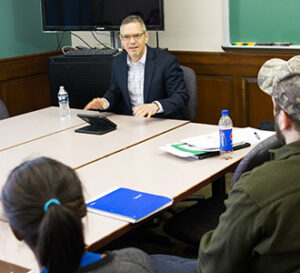Schauer, ’84, Has a Message for Albion Students: ‘We Are the Government’
Former Michigan congressman offers election-year insights in campus visit
March 2, 2016
 By Chuck Carlson
By Chuck Carlson
On a snowy Super Tuesday, Mark Schauer found a ray of sunshine.
“Empathy in politics is alive,” said the former U.S. congressman and 2014 Democratic Michigan gubernatorial candidate. “But with a faint pulse.”
The analogy fit nicely with the topic of his talk, “Is Empathy in Politics Dead? A Recovering Politician’s View from the Trenches,” sponsored by the Gerald R. Ford Institute for Leadership in Public Policy and Service.
Schauer, ’84 (right), who developed his love of public service as a Fordie, spoke to a group of about 40 people Tuesday in Bobbitt Auditorium, offering a sober look at politics in perhaps one of the strangest election years America has ever seen.
“It’s Super Tuesday,” Schauer said. “It’s impossible not to have Donald Trump creep into my talk.”
Indeed, Schauer—a Michigan state representative from 1997-2003, a state senator from 2003-09 and a member of the U.S. House of Representatives from 2009-11—has watched with mixed feelings as the businessman has surged to the lead among Republican candidates for president.
“I saw something similar in my congressional races in 2008 and more in 2010 with the rise of the Tea Party,” Schauer said in a separate interview. “It’s based around fear and economic uncertainty. I think he’s tapped into that fear but, unfortunately, he’s talked about it with ugly stereotypes like fear of immigrants competing for jobs. It’s really pitting one group against another, and I think we’re better than that.”
Schauer spoke of how past presidents such as John F. Kennedy, Franklin Roosevelt and Ronald Reagan tried to speak optimistically and enthusiastically about America.
“Donald Trump is not trying to take us to a loftier place,” he said. “That’s why this election is so important. Will politics of fear win out?”
That’s why Schauer took his message of empathy and decency to the students at Albion. And his message was simple.
“In the last presidential election, only 38 percent of 18- to 24-year-olds voted; that’s startling,” he said. “The stakes are incredibly high for their generation. One of the ways to increase empathy among politicians is to make sure they reconnect to people they represent, and the best way to ensure that is by voters participating in the process.”
He said institutions like Ford are vital to inform and enlighten students interested in public service and policy.
“The most fundamental way for them to lead is by voting,” Schauer said. “They need to hold elected officials accountable. It does reinforce that elections matter and have consequences. Who participates decides.”
He recounted as a freshman at Albion sitting in the home of a former professor and watching the results of the 1980 presidential election.
“It was an awakening,” he said.
It also spurred him to start looking into doing his part in the political realm. So he knocked on doors in support of Michigan congressman Howard Wolpe, who served in the U.S. House from 1978-1992.
“My eyes were truly opened [at Albion],” he said. “That was my ‘a-ha’ moment, when I realized that the people we elect make a difference.”

Schauer met with a group of Ford students prior to his Bobbitt talk.
Schauer, who lives in Battle Creek and currently serves as director of Advantage 2020, the national redistricting project of the Democratic Legislative Campaign Committee, hasn’t ruled out returning to politics. His last foray was two years ago when he was defeated in the governor’s race by incumbent Rick Snyder.
“I don’t have immediate plans to run for public office,” he said. “I may never again. There are a number of politicians whose identity is completely wrapped around a title and the public office they hold. My identity is not tied into being a legislator or congressman, or governor for that matter.”
But he still believes in the need for public service and what it can provide, and he still believes it’s the young people who can affect change. He said their use of social media can create small communities and lead to substantive, necessary discussions about the future of their country.
“They’ve seen negative campaigning and negative campaigning does suppress the vote,” he said. “But Albion College students are smarter than that. They need to not succumb to the negative messages and think that all of the candidates are lousy and none of them deserve their vote. They need to ignore the white noise and chatter. They need to realize that we are the government.”